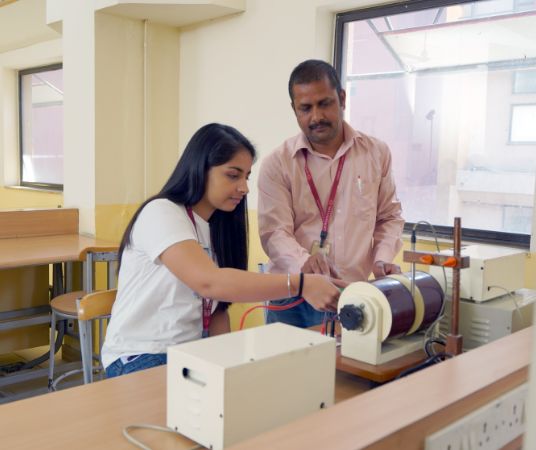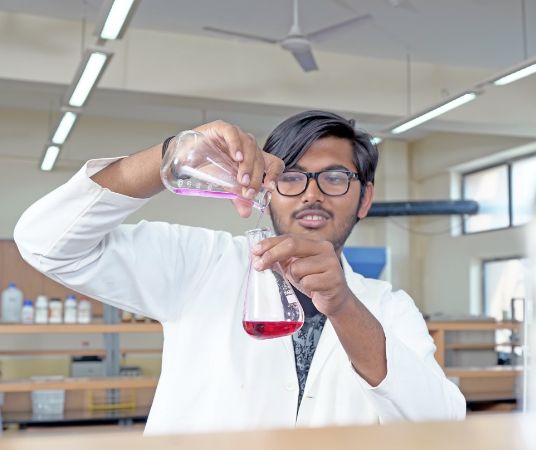PhD in Mathematics and Basic Sciences
NIIT University (NU)’s doctoral programme in Mathematics and Basic Sciences offers PhDs in Physics, Pure Mathematics and Applied Mathematics, Catalytic Chemistry, Material Chemistry and Organic Synthesis. Doctoral candidates who aspire to conduct discipline-based academic, industry or laboratory research, or aspire to leadership positions in Education will find that NU’s interdisciplinary programmes provide them with opportunities for high-level research.
PhD Mathematics
Doctoral programmes in Mathematics offer PhDs in both Pure Mathematics and Applied Mathematics. The interdisciplinary programmes swerve into other disciplines like Computational Mathematics and Atmospheric Science to provide students with a broad understanding of their subject of interest.
Area of research
- Computational Fluid Dynamics
- Heat and Mass Transfer
- Magneto hydrodynamics(MHD)
- Multiphase flow, porous flow
- Numerical methods, numerical simulation
- Computational geophysics (magma flow dynamics, volcanology etc)
- Multiphysics modelling and simulation
Physics
NU’s PhD Programme in Physics focuses on the scientific themes of Basic and Applied Physics. Major research within this interdisciplinary programme combines the exploration of physical and chemical properties of solids and liquids up to the molecular level. The ongoing research is mainly devoted to IR/Terahertz/UV-Vis/Raman/NIR spectroscopic study of solute-induced effects on water hydration dynamics. These techniques investigate vibrational motions of solutes in the aqueous phase and are important to understand hydrogen bond dynamics. Instrumentation yields complemented with molecular modelling help gain theoretical insights. This multi-disciplinary study vastly explores the solvation mechanism of various alkali, alkali-earth, lanthanide and transition metal ions and their mixtures with biological samples. This research stream is designed to shed light on the correlated interactions between solvate molecules and the solvent water.Chemistry
NU’s doctoral programme in Chemistry is a research-oriented degree programme. Students, as well as working professionals, can join NU’s PhD programme in Chemistry (in campus/off campus). The programme provides a conducive environment for encouraging scientific research and building higher order thinking skills. Students can pursue research with specialisations in the traditional areas of chemistry. However, much of the research is interdisciplinary, enabling students to go beyond traditional subject boundaries for their doctoral studies. The programme trains doctoral students for careers in teaching, research, resource management, environmental consulting, and for private sector/industrial positions.Areas of research
The programme offers advanced instruction and research training in environmental chemistry and environmental technology, leading to the degree of Doctor of Philosophy. Areas of research work include the development of advanced technologies and materials for water purification, environmental technology, and groundwater chemistry.
In the area of nano-catalysis, we are designing and synthesising a series of metal nanoparticles, supporting organic and inorganic materials (silica, metal oxides, metals, MOF etc) that support MMT Clay, hydrotalcite clay, Silica, Zeolite, PEG , Ionic liquids, etc. We are exploiting nano-catalysts for the development of sustainable reaction protocols for various challenging processes like CO and CO2 capture and conversion to fine chemicals (formic acid and ethanol), C-H bond activation, C-C coupling, olefination, and hydrogenation reactions.
Academic facilities
Physics lab
The Physics laboratory is equipped with modern equipment to carry out a wide range of experiments in almost all branches of Physics, including Measurement of Magnetic Susceptibility, Hall Effect, Ultrasonic Diffraction, Brewster’s Angle, Single and Double Slit Diffraction Study using He-Ne Laser, Normal Modes of a Coupled Pendulum, Electromagnetic Induction, Newton’s Rings, Polarimeter, Melde’s experiment and Diffraction Grating.

Chemistry lab
NU is strongly committed to providing the best hands-on experience to all students. The Chemistry laboratory in NU is well equipped to cater to undergraduate, postgraduate and PhD programmes in Chemistry. Apart from traditional lab equipment the Chemistry lab is well-equipped with a polarimeter, Beckmann’s apparatus, Stalagmometer, Ostwald viscometer, M.P. apparatus, pH meter, chromatography equipment, high-pressure autoclave, and high-pressure vacuum oven.





